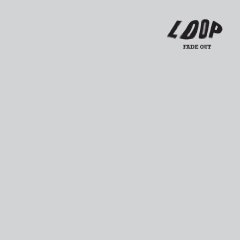Received wisdom would have you believe that the late 80s music scene was little more than the jangle of fey indie pop and dancey house grooves while anyone wishing to have their ears ripped to shreds by serious shards of noise would have to look to the other side of the Atlantic to get their jollies. Utter cock, of course, and as if to prove the point comes the timely arrival of the remasters of Loop’s first two albums.
Rewind: Along with Spacemen 3 and My Bloody Valentine, South London noise terrorists Loop were one of the few bands that referenced the nastier end of the 60s dream. For sure, many bands name-checked the poisoned majesty of The Velvet Underground or The Stooges’ minimalist hammerings, but the best that most of the C86 crowd could manage were watered down facsimiles of the New York band’s third album. So while the lovely ‘I’m Set Free’ et al set the template for the anorak wearers, those seduced by the lure of black leather, fringes and winkle-pickers were left wanting when it came to worshipping the domestic bastard offspring of ‘Sister Ray’.
As displayed by the coruscating blast of white light/white heat of ‘Soundhead’ that opened 1987 debut Heaven’s End, Loop had picked up the gauntlet laid down by the Jesus & Mary Chain’s ‘Never Understand’ and ran with it at full pelt. The likes of ‘Straight To Your Heart’ and ‘Fix To Fall’ eschewed the Mary Chain’s innate pop sensibility and took The Stooges’ moronic riffing to an even more simplistic degree and smothered them with layers of dense wah-wah and heavily treated guitar. In a decade where overdriven guitars hanging below the nipples were decried by the overly-sensitive as “rockist’ or, heaven forbid, “heavy metal”, Loop’s hypnomonotony was the drugged-up antidote to the diluted tweeness that pervaded the air.
Fade Out, released a year later, was heralded by the arrival of the monstrous ‘Collision’. Bigger, bolder and ballsier than what had gone on before, Loop had now started introducing an increasing number of Krautrock influences. So it was that ‘This Is Where You End’ and ‘Pulse’ were propelled by harder, pile-driving rhythms that upped the band’s ante by some considerable margin while the ferocity of the guitar attacks increased accordingly.
What makes these two re-issues doubly tantalising isn’t just the re-mastering that cranks up the volume and clarity needed for the best aural experience but the additional discs that make up the albums. Featuring alternate mixes and versions, the band’s second Peel Session reveals superior versions of ‘This Is Where You End’, ‘Collision’ and ‘Pulse’ while the band’s rendition of Suicide’s ‘Rocket USA’ remains a textbook example of how to take an influence, twist it yet still have the ability to turn the listener on to the original.
Loop may have fallen off the critical radar in favour of the reformed My Bloody Valentine and the continuing adventures of Jason Pierce’s Spiritualized but as these reissues conclusively show, the Croydon space cadets were every bit their equal and their influence is still keenly felt in heirs Secret Machines and Dead Meadow. What’s more, with their masterpiece, ‘A Glided Eternity’, slotted in for the same re-issue treatment next year, to come, there’s every chance that Loop’s rehabilitation will soon be complete.


